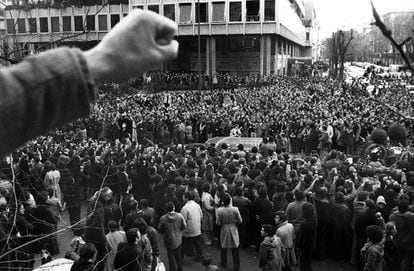The night Spain’s transition to democracy nearly derailed
New book explores the 1977 Atocha massacre of five labor lawyers in Madrid


When neo-fascists gunned down five labor lawyers inside their office in downtown Madrid on January 24, 1977, just over a year after the death of dictator General Francisco Franco, the government of Prime Minister Adolfo Suárez, along with much of the population, feared that the country’s nascent transition from dictatorship to democracy had been wrecked.
Instead, there were massive and peaceful street protests against the killings, and just as importantly, the authorities’ response was measured.
“In the end the killings helped consolidate the path to democracy,” says Alejandro Ruiz Huerta, a colleague of the five victims who miraculously survived thanks to a ballpoint pen in his breast pocket that deflected a bullet.
The men who were sent to prison for the killings never once repented, and allegedly celebrated every January 24 with a special seafood dinner
Ruiz Huerta believes that the events of that day, known in Spain as the Atocha massacre after the street where the killings took place, are now part of Spain’s democratic DNA. What’s more, the subsequent trial of the killers was a further opportunity for the new Spain to leave the violence of the past behind: “I have always believed in reconciliation, which is why we didn’t ask for the death penalty.”
Now, a new book by Jorge and Isabel Martínez Reverte reconstructs not just the crime itself, but also the mood in Spain almost 40 years ago. Jorge Reverte, a veteran journalist and historian, began the work as a solo project, but after suffering a stroke that left him physically disabled, he enlisted his sister, a recently retired journalist at state broadcaster RTVE.
A country in turmoil
Spain was in turmoil in early 1977 and many people questioned the loyalty of the security forces to the democratic transition. Meanwhile, the Basque terrorist group ETA and shady groups on the far left were pursuing a campaign of violence and kidnappings also aimed at destabilizing the state.
In the immediate aftermath of the killings, the situation was so volatile that the government said it could not guarantee the safety of the survivors, or even of the funeral cortege of the five murdered lawyers.
Two colleagues of the victims, Manuela Carmena, the current mayor of Madrid, along with José María Mohedano, played a key role in negotiations to ensure that the Communist Party – still illegal – would organize the funeral and ensure its peacefulness. Three months later, in April 1977, the Spanish Communist Party became legal, largely due to the killings and the responsible manner in which it responded.
“When we finally went back to work at the law firm, we organized teams of volunteers who stood guard all the way from the office down to the street. That lasted several months, and we forged some unforgettable relationships,” says Carmena, who was not on the premises at the time of the killings.
“They were second-rate gangsters, but then this isn’t Sicily”
Francisca Sauquillo, a retired senator and former Socialist Party member in the European Parliament, whose brother Javier was killed, recalls the sense of ever-present danger in those early days.
“Things were incredibly tense. It was very difficult fighting for democracy. The police and gunmen were always coming into the offices of labor lawyers. It was dangerous to attend street protests, because they could kill you. Seen in hindsight, 39 years later, it is hard to understand just how dangerous and difficult those times were.”
The book begins at 10.30pm on January 24, 1977 at 55 Atocha Street, which runs the half kilometer up from Atocha railway station to the Plaza Mayor. Two armed men walk into the office of labor lawyer Joaquín Navarro, who has taken on the transportation union set up by Franco and still run by supporters of the old regime.
But Navarro is in the building cafeteria downstairs, so the men open fire, emptying their magazines. They kill Enrique Valdevira Ibáñez, Luis Javier Benavides Orgaz and Javier Sauquillo, along with Serafín Holgado, a student, and office administrator Ángel Rodríguez Leal. Miguel Sarabia Gil, Alejandro Ruiz-Huerta, Luis Ramos and Lola González Ruiz, Sauquillo’s wife, are seriously wounded.
Current Madrid Mayor Manuela Carmena played a key role in negotiations to ensure that the Communist Party would organize the funeral and ensure its peacefulness
“The old labor unions were riddled with corruption, they had pistols on their desks, and they were committed to the old regime. The transportation strike in 1976 was a clear threat to them,” says Isabel Martínez Reverte.
The murderers, who were finally brought to trial and convicted in 1980, were Fernando Lerdo de Tejada, who managed to escape during a weekend furlough and has never been heard from since, despite a statute of limitations on the crime; Carlos García Juliá, who also fled Spain and is now in prison in Bolivia for drug smuggling; and José Fernández Cerrá, who was released on parole after 15 years behind bars. Francisco Corredera Albadalejo, a former regional transport boss under Franco, was convicted of ordering the killings. He died in jail.
But the judge in charge of the investigation did little to root out the many others who were involved, says Reverte in the book. “They were second-rate gangsters, but this isn’t Sicily,” says José María Mohedano, one of the victims’ lawyers and a key player in the story. “They had the power of a Franco-era labor union that was still alive and working, as well as the support of some police officers and the entire far-right. It makes me laugh when people say that the transition was a piece of cake: these people had very solid structures, even if the invididuals running them were crummy.”
No luck with Billy the Kid
Mohedano also attempted to question Antonio González Pacheco in connection with the Atocha crimes. Better known as Billy the Kid, he was a police inspector accused of torturing opponents of the regime. More recently, an extradition request by Argentina for crimes against humanity has been denied by the Spanish High Court.
Everyone interviewed for this article agreed on the importance of the efforts made in the days following the killings to prevent a spiral of violence.
And as Francisca Sauquillo points out, it wasn’t just the left that helped keep the transition on track. “The left played a very important role, but so did the democratic right. We were prepared to talk to anyone, and we were prepared to compromise to reach agreements.”
But the men who were sent to prison for the killings never once repented, and allegedly celebrated every January 24 with a special seafood dinner.










































